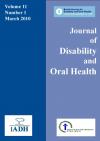Journal of Disability and Oral Health

- Cover Date:
- March 2010
- Print ISSN:
- 1470-8558
- Vol:
- 11
- Issue:
- 1
Editorial
Editorial
I am honoured to write an editorial for the Journal of Disability and Oral Health. As a medical doctor with a disability, a past campaigner for the rights of people with disabilities and a non-expert in oral health, it is heartening to see a health journal refer repeatedly in its editorials to both the rights of people with disabilities to receive high quality healthcare and a recognition of the predominance of the social over the medical model of disability. My personal passion is access to healthcare. Previous editorials have addressed the issue of access for people with disabilities. I wish to address the issue of access for those in poverty. The distance between inaccessibility for people in poverty versus with disability is not great. In fact, they are inextricably linked with reports consistently showing disabled people being hugely more likely to end up in poverty than the general population (National Disability Authority, Leonard Cheshire Disability). Tudor Harts Inverse Care Law, which states that the need for healthcare is inversely proportional to the provision of healthcare (or more simply put, those who most need health services are least likely to get them) sadly is persistently and consistently validated. It is my contention that no matter how high its standards of healthcare delivery, an inaccessible healthcare service can lay no claim to being a quality service. It has been demonstrated that lack of access results in patients being less likely to attend a physician, avail of preventive or appropriate diagnostic and therapeutic services, or bring their prescriptions for dispensing (Weinick et al., 1996; Krauss et al., 1998; Newacheck et al., 1998; Baker et al., 2000; Lasser et al., 2006). Prewitt identified continuous access to primary care in inner cities as the primary approach to address health inequalities (Prewitt, 1997). Homeless people suffer from high levels of dental problems (Conte et al., 2006). In Ireland, access to both primary care and dental health services is dependant on having a medical card, a means-tested way of accessing care. Yet in Dublin, it has been shown that 45% of homeless people do not have medical cards (O’Carroll and O’Reilly, 2008). A specialised dental service had been set up in Dublin to provide access to dental services for homeless people was set up, yet it has not had an incumbent for some months for lack of staffing. Thus in the specialised GP clinic we run, we frequently come across homeless people with acute dental pain and no access to any clinic (never mind those requiring non-acute dental treatment). In the UK it has been reported that homeless people find it difficult to access dental services (Dentistry; Homeless Link, 2009) Even if you have a medical card in Ireland it can be difficult to get a dentist to provide treatment.
- Article Price
- £15.00
- Institution Article Price
- £
- Page Start
- 2
- Page End
- 2
- Authors
- Dr Austin O’Carroll
Articles from this issue
- Title
- Pg. Start
- Pg. End
- Establishing a procedure for managing poor standards of oral care in vulnerable and dependent adults
- 14
- 16
